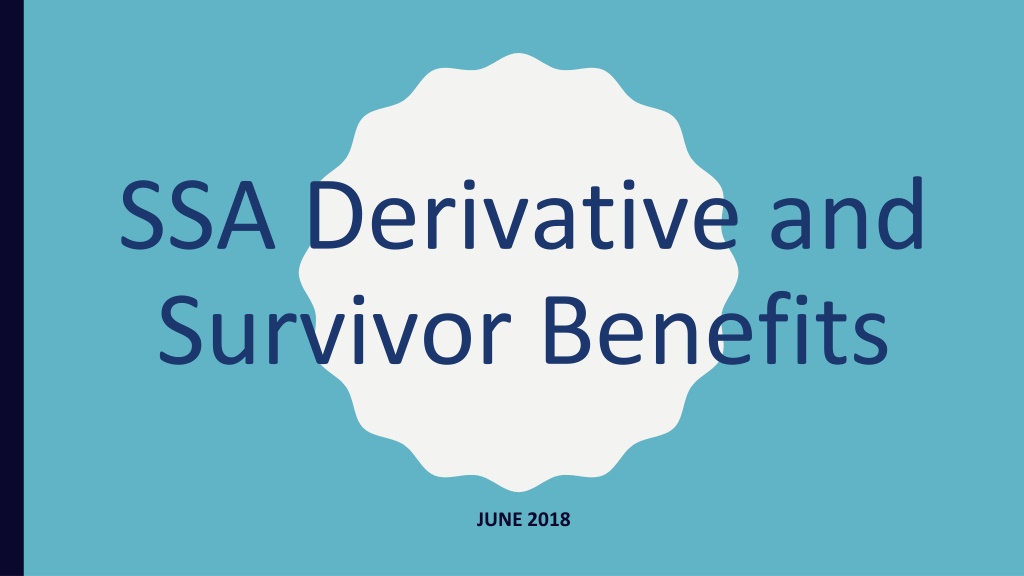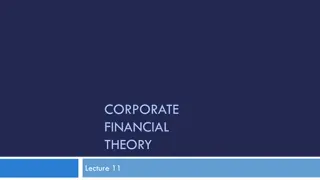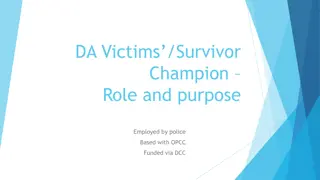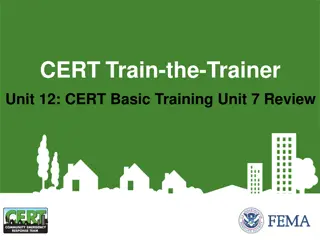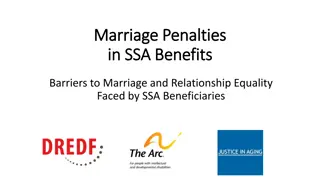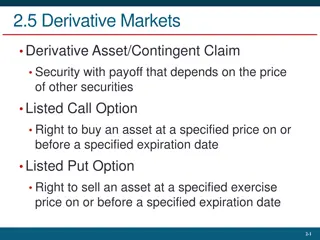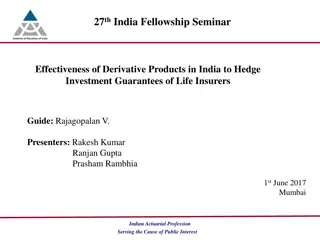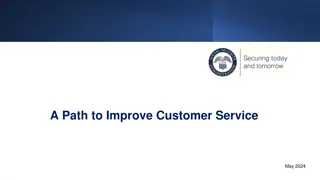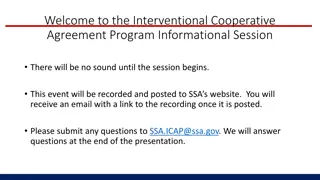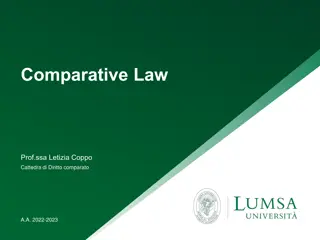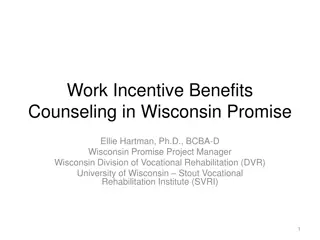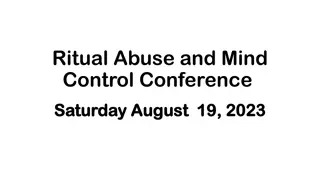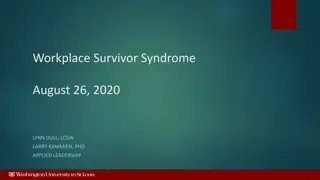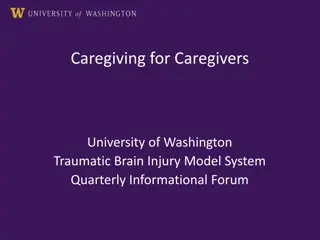Understanding SSA Derivative and Survivor Benefits
Learn about Social Security Administration (SSA) derivative and survivor benefits, including eligibility criteria, different types of benefits available, how to apply, and important details for spouses, children, and ex-spouses. Find out who qualifies as a worker, the insured status requirements, and the process for applying for derivative benefits. Gain insights into how to collect benefits on another worker's record and understand the rules concerning retired and disabled workers. Discover valuable information about credits needed for benefits and application procedures for various beneficiaries.
Download Presentation

Please find below an Image/Link to download the presentation.
The content on the website is provided AS IS for your information and personal use only. It may not be sold, licensed, or shared on other websites without obtaining consent from the author. Download presentation by click this link. If you encounter any issues during the download, it is possible that the publisher has removed the file from their server.
E N D
Presentation Transcript
SSA Derivative and Survivor Benefits JUNE 2018
Pop Quiz! Website: kahoot.it Enter PIN Red Triangle (left) = FALSE Blue Diamond (right) = TRUE
Collecting SSA Benefits on Another Worker s Record Spouse Minor Child Adult Disabled Child Ex-Spouse Derivative Benefits (Worker is alive) Widow/Widower Ex-Spouse Minor Child Adult Disabled Child Dependent Parent Survivor Benefits (Worker is deceased)
Whos the Worker? Retired Worker Worked in covered employment long enough to be insured and who is at least 62 years old Receives benefits equal to primary insurance amount at 65 Max benefits are payable at age 70 Disabled Worker Worked in covered employment long enough to be insured and who had been working recently in covered employment prior to disability onset
Insured Status A worker can earn up to four credits each year $1,320 of wages or self-employment income is one credit (2018) Number of credits needed for benefits depends on the worker s age and the type of benefit In general, the younger a person is, the fewer credits they need No one needs more than 40 credits to be eligible for any benefit
How to Apply Derivative Benefits Spouse Can apply online, over the phone, or at local SSA office Ex-Spouse Can apply online, over the phone, or at local SSA office Children Must apply over the phone or at local SSA office Survivor Benefits Cannot apply online; must apply over the phone or at a local SSA office Better to apply ASAP as there may only be a short window for retroactive benefits
DERIVATIVE BENEFITS
Spouses Worker must be receiving benefits for spouse to receive benefits Claimant must have been married to worker for at least 1 continuous year Spouse over age 62 can qualify for benefits, will qualify for Medicare at age 65 At full retirement age (FRA), spouse s benefit cannot exceed of worker s full retirement amount If between age 62 and FRA amount will be permanently reduced by a percentage based on the number of months up to spouse s FRA Benefits may be affected by the retirement earnings test if spouse is under FRA and working while receiving benefits Spouse of any age caring for a child under 16 or an adult disabled child receiving benefits can receive benefits If spouse is eligible for benefits based on their own record, SSA will pay a combination of benefits equaling the higher benefit amount Derivative Benefits
Ex-Spouses Worker must qualify for SSDI or retirement benefits Worker does not need to be receiving benefits Ex-spouses must: Be at least 62 years old Be unmarried Have been married to the worker for at least 10 years Not be eligible or an equal or higher benefit on their own or someone else s Social Security record Have been divorced for at least 2 years if worker has not yet filed for benefits If an ex-spouse remarries, they cannot collect benefits on a former spouse s record unless the later marriage ends Derivative Benefits
Spouses & Ex-Spouses Born Before 1/2/1954 Spouses and ex-spouses born before 1/2/1954 who have reached FRA can choose to receive only the (ex)-spouse s benefit and delay receiving their own retirement benefit until a later date FRA is 66 for people born between 1943-1954 If spouses or ex-spouses born on 1/2/1954 or later file for one benefit, they will be effectively filing for all retirement or spousal benefits available Derivative Benefits
Children Worker must be receiving benefits for child to receive benefits Can be biological child, adopted child, stepchild, or dependent grandchild Child must be unmarried and: Under age 18; or Be 18-19 years old and a full-time student (no higher than 12th grade); or Be 18 or older and have a disability before age 22 Each qualified child may receive a monthly payment up to worker s benefit amount If child is working while receiving benefits, the retirement earnings test applies Derivative Benefits
Maximum Family Benefit If spouse and children qualify for benefits, the total amount they can receive is 150%-180% of the worker s full benefit Total depends on worker s benefit amount and the number of family members who qualify for benefits on that record Benefits paid toward family members will not decrease the worker s benefit If an ex-spouse qualifies for benefits, it will not affect the amount of benefits the worker or family may receive Derivative Benefits
Case Example Jane was married to Joe for 35 years. Joe stayed home and took care of their three children while Jane got her law degree and started her own law firm. Jane became a successful (and wealthy) attorney. After 35 years of marriage, Jane had an affair with her personal trainer, Sven, who was 30 years her junior. Jane divorced Joe and married Sven. Jane adopted Sven s 2-year-old daughter, Ingrid. However, after 3 years, Jane divorced Sven and married George, a high school teacher. Jane is now 64 years old and thinking about winding down her law practice. George is 62. Jane has decided not to draw Social Security benefits until she reaches full retirement age, in part because of her mistaken belief that this will stop Joe from getting any more of her money. Will Joe, Sven, Ingrid, and/or George be entitled to benefits on Jane s record? Derivative Benefits
Case Example (cont.) Joe Because Joe and Jane were married for more than 10 years, Joe is entitled to benefits on Jane s record as long as he does not remarry. If he wants until FRA, he could receive up to 50% of Jane s total Social Security retirement benefit. Joe s benefit will not reduce or affect any benefit available to Joe or his current or former spouses. Joe can begin drawing an early benefit at age 62 regardless of whether Jane has begun drawing Social Security benefits because they have been divorced for more than 2 years. Sven Sven will never be entitled to benefits on Jane s record because they were not married for 10 years. However, he s 34, so he has plenty of years left to work and isn t planning to retire anytime soon. Derivative Benefits
Case Example (cont.) Ingrid Ingrid will be eligible for benefits only if Jane starts drawing benefits. She must be unmarried and under 18 (or 18-19 and a full-time high school student) in order to qualify. George George will be entitled to benefits on Jane s record when Jane begins drawing benefits. Jane is refusing to draw a benefit because she resents Joe, but all she is doing is preventing George from drawing benefits. Fortunately, George has a long work record of his own, so he could start drawing on his own record if he wanted. Derivative Benefits
SURVIVOR BENEFITS
Widow(er)s Must have been married for at least 9 months If widow is FRA = 100% of the worker s benefit If widow is age 60 FRA = 71.5 99% of benefit If widow is disabled, age 50-59 = 71.5% of benefit If widow is caring for a child who is under age 16 or disabled = 75% of benefit A widow caring for a child can receive benefits if the deceased worker has credits for 1 years (6 credits) in the 3 years before death $255 one-time lump sum death benefit Benefits stop if widow remarries before age 60 Survivor Benefits
Surviving Divorced Spouses Must be at least age 60 (50 if disabled) Must have been married to worker for at least 10 years Same as percentages for Spouse Eligibility for benefits stops if ex-spouse remarries before age 60 (before age 50 if disabled), unless that marriage later ends in divorce, death, annulment Survivor Benefits
Minor Children Must be under 18 or between 18-19 years old and attending high school full-time 75% of benefits $255 one-time lump sum death benefit Children can receive benefits if the deceased worker has credit for 1 years of work (6 credits) in the 3 years before death Survivor Benefits
Adult Disabled Children Must be over 18, unmarried, and have disability that started before age 22 75% of benefits $255 one-time lump sum death benefit Survivor Benefits
Parents Dependent parent must: Be at least 62 Have been receiving at last half their support from the worker Not eligible to receive a higher retirement benefit on their own record Not have married after worker s death Stepparent or adoptive parent may receive benefits if they became the worker s parent before the worker was age 16 Survivor Benefits
Case Example Jane dies tragically in a freak yacht accident. Are Joe, Sven, Ingrid, and/or George entitled to survivor benefits? Survivor Benefits
Case Example (cont.) Joe If he is over 60, Joe is entitled to survivor benefits as Jane s ex-spouse because they were married for more than 10 years. What if Joe remarries? If he is over 60, he can remarry and still be eligible for survivor benefits on Jane s record. However, he may be eligible for a higher amount on his new spouse s record. Sven Sven is not entitled to benefits on Jane s record because he is under 60, and their marriage did not last 10 years. Survivor Benefits
Case Example (cont.) Ingrid Ingrid is entitled to survivor benefits on Jane s record if she is under 18 or 18-19 and a full-time high school student. She s also eligible for a $255 lump sum death benefit. George George is eligible for survivor benefits if their marriage lasted at least 9 months. He would also be eligible for a $255 lump sum death benefit. What if George remarries? Because he is over 60, his eligibility for benefits on Jane s record would not be affected. Survivor Benefits
